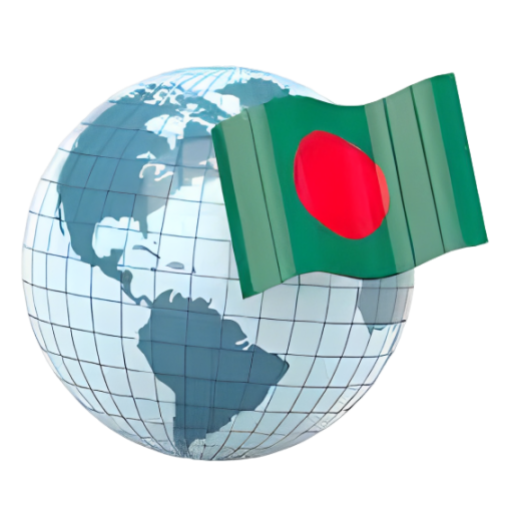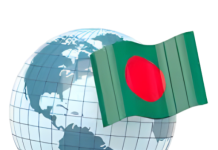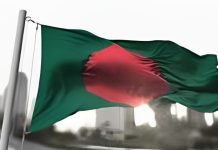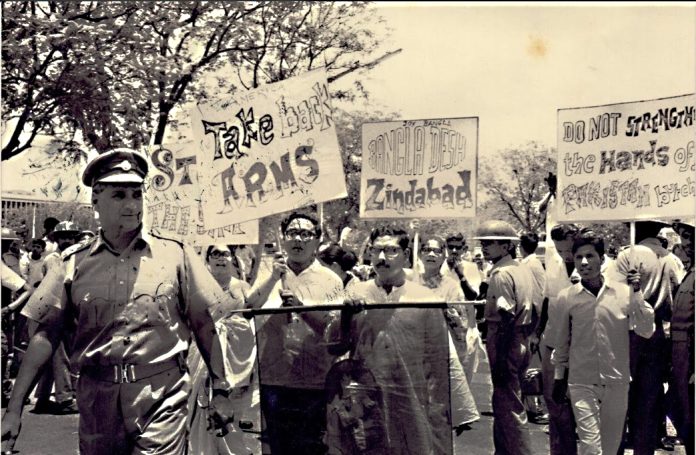
On 6 April, 1971, my husband, KM Shehabuddin, became the first diplomat to defect from Pakistan and pledge allegiance to Bangladesh. Shehabuddin had joined the Pakistan Foreign Service in 1966 and we had gotten married in 1967. His defection served as a beacon for other diplomats and gave strength and courage to freedom fighters on the ground.
Shehabuddin was serving as second secretary at the Pakistan High Commission in New Delhi when we received news of the brutal military crackdown in Dhaka on 25 March and heard Bangabandhu’s stirring declaration of independence. We were utterly heartbroken and horrified by the news of the massacre of unarmed civilians and desperately wanted to do whatever we could to serve Bangladesh’s struggle for liberation.
My husband informed his trusted friend and colleague Mr. Amjadul Huq, the press attaché at the Pakistan High Commission, of his decision to resign from the Pakistan Foreign Service and work for Bangladesh’s liberation. Mr. Huq immediately said, “I am with you. You have my full support.” He did, however, have some concerns:
“You have a family. Have you thought of your wife and two little daughters? Your father-in-law must have had certain hopes when he agreed to your marriage with his daughter. He must have expected that you would one day become an ambassador of Pakistan. If you defect, that will never happen. If Bangladesh isn’t liberated, you may be tried and executed for treason. What will happen to your wife and children?”
Mr. Huq, who decided to defect with us, spoke with me in person and repeatedly asked me if I fully understood the potential consequences of such a drastic move. I was 24 at the time – with two toddlers. We would be trading a life of comfort and privilege for one of uncertainty and insecurity. The Mujibnagar Government had not yet been formed. No one knew how long the war would last and whether Bangladesh would ever gain independence. What if Pakistan prevailed and tried us for treason?
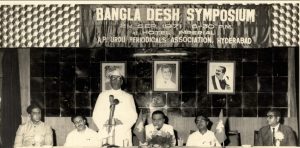
As far as anyone could tell, the war could stretch for years, with no guaranteed outcome. The examples that we had as reference points were Algeria and Vietnam – wars that had gone on for years and years.
K.M. Shehabuddin as the Chief of Bangladesh Mission with the Indian central ministers Mr. Shafi Qureshi, Mr. Dikshit and Mr. Moinul Huq Chowdhury at a symposium on Bangladesh on 2 September 1971
Yet, for us, the decision was clear – we simply could not serve a government responsible for unforgivable crimes against our people. I told Mr. Huq that we would rather die than remain with Pakistan. The government of Pakistan had blood on its hands. We would not be able to live with ourselves, sleep at night, or even eat if we did not denounce Pakistan and proclaim our support for Bangladesh.
Our defection involved intricate planning and discreet discussions with key figures sympathetic to our cause. On 28 March, we met with Mr. AK Ray, a senior diplomat, Dr. Triguna Sen, a member of the Rajya Sabha, Mr. Dilip Mukherjee, the diplomatic correspondent at Times of India, and Peter Hazelhurst, a correspondent for the London Times.
Hazelhurst had just returned from Dhaka to Delhi and told us in detail about the targeted killings of professors and brutal massacre of students at Jagannath Hall at Dhaka University on March 25. Learning these details strengthened our resolve to make every effort to join the liberation struggle. We informed Mr. AK Ray that my husband wanted to leave the Pakistan Foreign Service so that we could work for the liberation of Bangladesh.
Mr. AK Ray said he would need some time to seek the necessary permissions and complete the formalities as this was a delicate matter. We were on foreign soil and would basically be stateless once we defected. One of the concerns of the Indian Ministry of External Affairs involved the safety of Indian citizens and diplomats in Pakistan. India still had diplomatic relations with Pakistan. If India gave asylum to defectors like us, Pakistan would be likely to see this as a hostile act and might retaliate against Indian citizens.
On 5 April, Mr. AK Ray informed us that we would be able to work for Bangladesh on Indian soil. We tried to pack our essentials as discreetly as possible to avoid drawing the attention of our staff and any visitors. On the night of 6 April, with our two toddlers and two suitcases, we left our home as it belonged to the Pakistan Mission and went to a safe house with the help of Indian officials.
At midnight, at the residence of Mr. Dilip Mukherjee, Shehabuddin and Mr. Huq held a press conference in which they declared:
“From the 26th of March we have observed with horror and anguish the happenings in Bangladesh. In the massive and sudden onslaught on our unsuspecting and defenceless people by the immoral and ruthless military machine of Islamabad, we saw our worst fears being realised, that an armed and unscrupulous minority of West Pakistan would seek to silence and exterminate the majority with bullets and bombs and thereby achieve their goal of perpetrating the slavery of the people of Bangladesh.
The people of Bangladesh consider the Islamabad Government a foreign colonial regime, which has shown itself to be more oppressive and barbarous than any history has ever known. The Pakistan army in Bangladesh is an occupation force. It has no sanction other than its bayonets, tanks, and fighter-bombers.
Islamabad is engaged in a wanton and demented massacre of the innocent and unarmed people of Bangladesh. World opinion has begun to realise the magnitude of this outrage. We appeal to all decent and civilised people everywhere in the world for sympathy and concrete assistance. We appeal to the nations of the world to recognize the sovereign state of Bangladesh.
We have severed our connection with the fascist military dictatorship in Islamabad, as our conscience no longer permits us to act against our deepest convictions.
From now our allegiance is to Bangladesh, which derived its authority from the unambiguous mandate of the 75 million Bengali people.” (KM Shehabuddin, There and Back Again: A Diplomat’s Tale, Dhaka: UPL, 2006, 82).
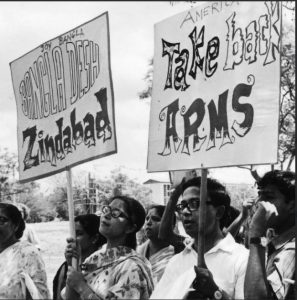
On 10 April, the Mujibnagar Government was formed and the oath-taking ceremony took place on the 17th. On 18 April, we received the wonderful news that Mr. Hossain Ali and the other Bengali officers and staff at the Consulate in Calcutta had also defected from Pakistan and pledged allegiance to Bangladesh. My husband and Mr. Huq went to meet with the Mujibnagar leadership in Calcutta on 2 April. They asked the leaders for permission to open an Information Centre in Delhi to raise awareness and galvanize support for the Liberation War.
K.M. Shehabuddin & Khaleda Shehabuddin demonstrating in front of the US Embassy in New Delhi on 26 June 1971
This Centre became a hub for mobilizing support for Bangladesh and spreading awareness about the Liberation War while countering Pakistani propaganda. Our efforts were aimed at rallying diplomatic support and ensuring proper aid to freedom fighters. We opened our home to the many Bangladeshi academics, politicians, artists, doctors, and activists passing through Delhi as they sought to figure out how they could best support Bangladesh. We also organized and participated in protests in the front of the US Embassy as the US continued to supply Pakistan with arms.
In addition to Mr. AK Ray, Dr. Triguna Sen, and Mr. Dilip Mukherjee, we received tremendous support from Mr. Ray’s wife Gayatri-di, Mr. Mukherjee’s daughter Shikha, the historian Dr. Tapan Roy Chowdhury, and the economist Dr. Ashok Mitra.
For several weeks, I did not receive news of my family in Dhaka and Chittagong and feared the worst. My parents and siblings lived right next to the East Pakistan Rifles compound in Dhanmondi and I had heard that there had been 48 hours of constant shelling there. In June, my sister Rasheda arrived in Delhi with her husband Tanwir Nawaz. They informed me that my family members and in-laws were thankfully alive but that Pakistani soldiers had brutally beaten my brother Saleem and imprisoned my sister Saqi’s fiancé Iqbal Ahmed, already well-known for defiantly singing patriotic songs. It was only after the war that we would learn of the brutal torture Iqbal had suffered during his long imprisonment. Tanwir helped my husband at the Information Centre while Rasheda helped me take care of the stream of visitors from Bangladesh and around the world.
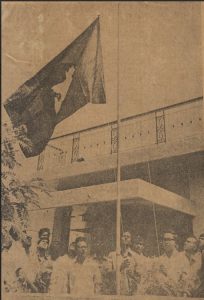 On 31 August, my husband and his colleagues inaugurated the Bangladesh Mission in Anand Niketan and proudly hoisted our national flag. The inauguration was widely covered by the media and applauded as yet another milestone in Bangladesh’s path to liberation.
On 31 August, my husband and his colleagues inaugurated the Bangladesh Mission in Anand Niketan and proudly hoisted our national flag. The inauguration was widely covered by the media and applauded as yet another milestone in Bangladesh’s path to liberation.
K.M. Shehabuddin as the Chief of Bangladesh Mission in New Delhi, unfurling the national flag of the People’s Republic of Bangladesh on the occasion of the formal inauguration of the Bangladesh Mission, in Anand Niketan on 31 August 1971
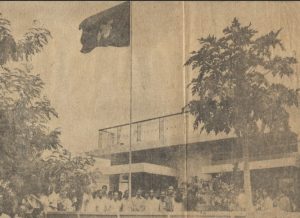
The four Bengali staff members of the Pakistani Mission and their families at a press conference on 30 September 1971 after the rescue at Haryana Border
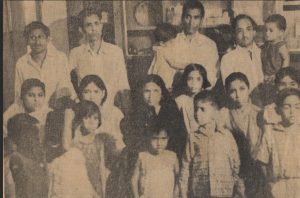 In September, there was an interesting incident involving the Bengali employees of the Pakistan High Commission. The Pakistan High Commission put them on a bus to send them to Pakistan. My husband and Mr. Amjadul Huq learned about this from some source, so they went to the Haryana border to intercept the bus with the help of Indian officials. When the four Bengali employees from the Pakistan High Commission and their families saw my husband and Mr. Huq, they were very excited. They started chanting “Joy Bangla!” They were delighted that the plan to forcibly transfer them to Pakistan had been foiled.
In September, there was an interesting incident involving the Bengali employees of the Pakistan High Commission. The Pakistan High Commission put them on a bus to send them to Pakistan. My husband and Mr. Amjadul Huq learned about this from some source, so they went to the Haryana border to intercept the bus with the help of Indian officials. When the four Bengali employees from the Pakistan High Commission and their families saw my husband and Mr. Huq, they were very excited. They started chanting “Joy Bangla!” They were delighted that the plan to forcibly transfer them to Pakistan had been foiled.
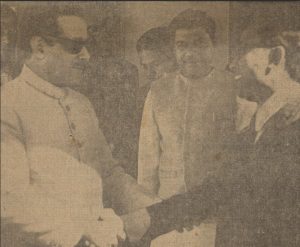
The recognition of Bangladesh by the Indian parliament on 6 December was a momentous occasion in our struggle. Many members of parliament and journalists came to our house with bouquets of flowers to congratulate us. My husband was ill that day, but the news of India’s recognition of Bangladesh delighted him and gave him strength. The next day Mr. TN Kaul, the foreign secretary, called my husband to the Ministry of External Affairs and handed over the letter of recognition, which he then forwarded to the Mujibnagar Government.
Over the course of the war, many Bengali diplomats around the world declared their allegiance to Bangladesh and resigned from the Pakistan Foreign Service. As my husband noted in his autobiography, There and Back Again: A Diplomat’s Tale, over 100 diplomats resigned from the Pakistan Foreign Service in protest and dedicated themselves to working for Bangladesh’s liberation. The defections of Mr. Hossain Ali, Mr. Anwarul Karim Chowdhury, and 63 other Bengali personnel in Calcutta on 18 April, Mr. Mahmood Ali in New York on 26 April, Mr. Muhith in Washington DC on 30 June, Mr. Mohiuddin Ahmed in London on 1 August, and Ambassador Abul Fateh in Baghdad on 15 August filled us with pride and hope.
The diplomat freedom-fighters listened to their conscience and dared to believe in an audacious dream that came true on 16 December, 1971. We remain indebted to the sacrifices of the martyrs and freedom fighters who gave their blood for our freedom. May we never take that freedom for granted.

Khaleda Shehabuddin
Mrs. Khaleda Shehabuddin is the wife of late Ambassador KM Shehabuddin, who served as Bangladesh’s ambassador to Poland, Kuwait, France, and the US. Ambassador KM Shehabuddin passed away in April 2015 and was posthumously awarded the Shadinota Purushkar in March 2016.
